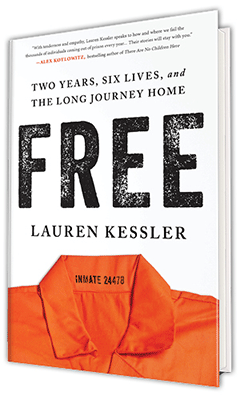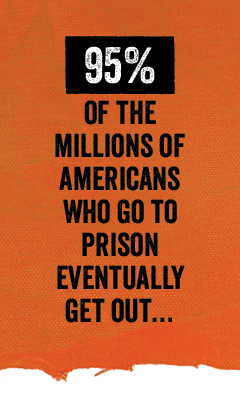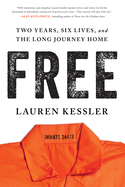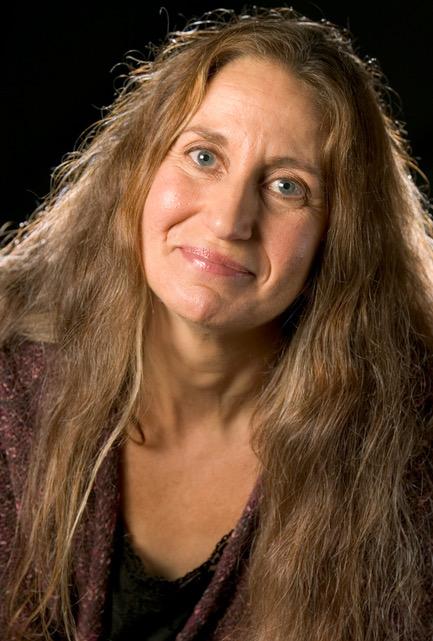Free: Two Years, Six Lives, and the Long Journey Home
by Lauren Kessler
In the piercing, poignant Free: Two Years, Six Lives, and the Long Journey Home, reporter and prolific author Lauren Kessler explores the reality that is mass incarceration in the United States. In her previous book A Grip of Time, Kessler chronicled her experience running a years-long writing group for "lifers" in a maximum-security prison. The trust granted to her by the people in that project, and this one, is remarkable. In Free, Kessler explores six specific individuals' stories, via audio, video and text records, and deeply candid, thorough interviews. Many of their loved ones offer additional perspective. The result is riveting. Unforgettable.
Our incarceration numbers are staggering. "With just 5 percent of the world's population, the United States accounts for close to 25 percent of the world's prison population. One out of every six Latino boys... can expect to go to prison in his lifetime. One out of every three Black kids... will spend time behind bars. (For white kids, the figure is one out of seventeen.)" According to United Nations databases, the U.S. incarceration rate is higher than those in Russia, China and North Korea. "On any given day one-third of adult Americans are either incarcerated, on probation, or on parole."
By focusing on six nuanced portraits, Kessler captures the complex panorama of a system that encompasses those incarcerated, their loved ones and those affected by the crimes. All six were convicted of serious offenses. All underwent long-term incarceration, and many were under 18 when convicted. They are men and women of various ages and racial identities, powerfully sharing their experiences in prison, and--if and when released--their experiences beginning reentry.
Among those whose stories Kessler covers are Arnoldo, Sterling, Travis, Catherine, Dave and Vicki. Several were convicted of murder; there's struggles with addiction; histories of abuse are rampant. But in Kessler's telling, neither crimes nor circumstances make up the full picture. They are kind, complicated, flawed, generous, nervous, repentant and sincere. Above all, they're people.
Kessler acknowledges an inevitable question: Why care? Shouldn't those who do wrong be punished? Of course, it's not so simple. But in addition to the myriad ways people are not treated equally in the U.S. legal system, Kessler suggests an alternative motivation for caring: selfishness. After all, she points out, 95% of those incarcerated get out at some point, rejoining society: "Their kids sit in classrooms next to our kids. They are our neighbors. Living inside cages behind walls can have profound effects on personality and behavior, on health and attitude, on what kind of person rejoins our community." There are obvious needs for the system to "work." Yet, reentry itself is complicated, full of barriers and challenges. Kessler relays a memorable anecdote about attending a simulation exercise designed to help volunteers interested in learning more about the penal system better understand its difficulties. Even the simulation exercise requires counselors to be on-hand to comfort the participants--who are willing and motivated to be there and learn. But the hourlong exercise that has them practice navigating services and requirements can be crushing. And people recently released from prison to find their paths are rarely so well supported in the extraordinarily complicated steps reentry demands.
This is the crux of Free. Through stories, Kessler asks us to reckon with fundamental questions--what is justice? what is rehabilitation?--alongside the fundamental facts of the barriers facing those who go through a system that doesn't often seem to deliver either. Nor does it seem to prepare its occupants for "successful" reentry. Still, as Kessler makes poignantly, painstakingly clear throughout, much of the data is far more complicated than the numbers suggest. While 68% of those released are rearrested within three years, situations differ. People differ. What "successful" looks like differs.
Kessler spotlights the movement for Restorative Justice while still making room to share the difficulties for victims' families in considering this approach. In yet another unforgettable chapter, Kessler recalls a parole hearing for Sterling, in which she is among the speakers advocating for his release. But his victims' parents speak, too, and their words likewise reverberate on the page. It's riveting in Kessler's retelling, painful from every angle. The situation, like so many others, asks additional hard questions. Kessler wonders: "Short of 'an eye for an eye,' what is a life 'worth'? How much punishment is enough? Is any punishment enough?"
Kessler braids in hope and celebrates resilience; Free might otherwise be an impossible read. She also builds in critical space to remind readers of just how many stories remain untold or unheard. Again, the stakes are high: "We want those who have done harm to us to suffer, to pay for what they did," Kessler writes, "But in making them suffer, we create the kind of human beings we do not want back in our communities."
Change in our prison system has long been needed, and the chaos and cruelties wrought by Covid-19 on people in prison, both those serving time and those staffing the facilities they all share, highlight the grave stakes. For readers in the U.S., Free is a sobering, necessary mirror. What does this system say about us? Where will we go from here, and how--and most urgently, when? --Katie Weed








